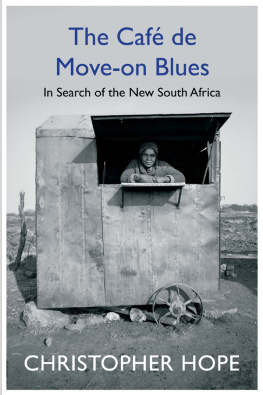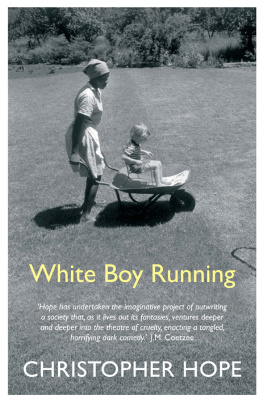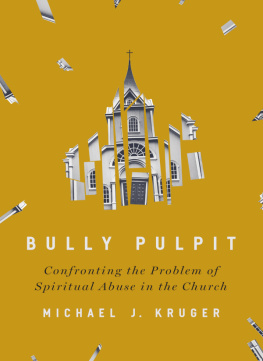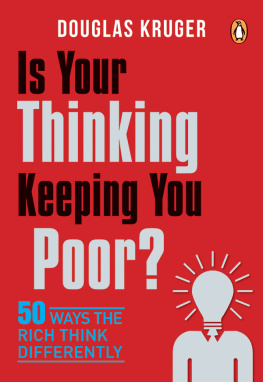Christopher Hope
Kruger's Alp
Pray, did you never hear what happened to a man some time ago of this town (whose name was Christian) that went on a Pilgrimage up towards the higher regions?
John Bunyan, Pilgrims Progress
They took the hill (Whose hill? What for?)
But what a climb they left to do!
Out of that bungled, unwise war
An alp of unforgiveness grew.
William Plomer, The Boer War
We knew nothing of the theatrical element which is part of all revolutionary movements in France, and we believed sincerely in all we heard.
A. Herzen, Childhood, Youth and Exile
As I walked through the wilderness of what remained of the world of Father Lynch and his little guild, I saw much to disturb me. Here was the last vestige of the parish garden where the bulldozers, earth-movers, grabbers and cranes had frozen into that peculiar menacing immobility giant machines assume when switched off; left as if stunned, open-mouthed, gaping at the human foolishness of wishing to stop work when they are strong and willing to continue. They stood silent, it being Sunday, resting from their merciless preparation of this new site for one of the enormous hostels of the huge University of National Christian Education, widely declared to be the largest in the southern hemisphere. I looked around me and found the work nearly complete. However, the machines had stopped eating for the moment; ours is a holy land and even the destruction of redundant churches halts on the Sabbath.
The advance of the university over the years had been slow but inexorable; at first, parcels of the extensive grounds of St Judes had gone and, wisely, Lynch had not fought against this but had preserved his energies for guarding the church itself and his garden. His community of priests and lay brothers had been whittled away one by one. Bishop Blashford had conducted negotiations with the university so as to safeguard what he called an orderly withdrawal, with a skill which had won him the admiration of municipal councils across the country and the commendation of the Papal Nuncio, Agnelli.
I stood in the destroyed church with the gaping roof. All religious ornaments had been removed, the sentimental paintings of lambs in emerald meadows, the wooden stations of the cross, the stained-glass windows of obscure martyrs, the baptismal font, the giant crucifix which had swung above the altar, the doors of the confessionals torn off so that now the little chambers gaped like disused lavatories. All gone the golden tabernacle, the candles, the altar stone, the plaster Virgin in her sky-blue drapery and her brass circlet of stars, the wooden St Joseph with his surprising paunch, his bluff good looks and his blue sea-captains eyes; all the gaudy, inappropriate prints of Italianate saints, all gone; the ruby glass altar lamps in which the tiny flame glowed perpetually, the wooden altar rail at which Blanchaille had stood with his boat boy, Mickey the Poet, beside him, fumigating the first few rows of the congregation with pungent incense, the sacred cardboard hosts that stuck to the roof of the mouth for half an hour after Communion, the chalices, the sweet and rather yeasty smell of the cheap Jewish wine Lynch favoured for the Mass, the ciborium, the copes and chasubles stiff with gold thread, all the intoxicating plumage by which ordinary, irritable, balding men transformed themselves into birds of paradise and paraded to the strangely comforting sound of brass bells; all the absurdly delightful foreign paraphernalia with which a diminishing band of Catholics in a not very notable parish chimed, chanted, blessed and perfumed the start of each bright indifferent African morning. Only the pews remained now, the dark, polished mahogany pews, on the last two of which, at the rear of the church, I could make out still, small oblong patches of lighter wood where the brass plates had been; they were marked RESERVED, thus delicately designating the seats for the handful of black servants who used this church until Father Lynch had the plates removed, in the face of considerable opposition, in the days when these things were regarded as perfectly normal and fully in accord with the will of God and the customs of the country.
I saw that only Father Lynchs favourite tree, from beneath which the dying master of altar boys once conducted his famous picnics, was still standing. The Tree of Heaven, we called it, or Ailanthus altissima Father Lynch taught with desperate pedantry. Like Buddha, beneath the sacred Bo tree, Father Lynch sat though there had been nothing Eastern about Father Lynch, who was small, thin and elfish and who told his boys that the name of the tree was highly misleading since its male flowers smelt pretty damn awful and its roots were a threat to the foundations of the church. It was beneath this Tree of Heaven that I lay down around noon and slept. And while I slept I dreamed.
In my dream I saw Theodore Blanchaille and he was not particularly well-dressed. But then hed always been rather a sloppy character, old Blanchie, or Father Theodore Blanchaille as we learnt to refer to him, or Father Theo of the Camps, as he was known in the old days, or plain Mr Blanchaille as we must refer to him now, I suppose. He was wearing an old pair of khaki shorts, baggy, creased and much too big for him, and a weird kind of sailors top of jagged dark blue stripes, squared at the neck. He was barefoot and sat in an empty room on a plastic chair. He was a big fellow carrying too much weight, but then hed always been heavy, and I could see his belly pushing at the thin cotton shirt, and the plastic bands of the garden chair he sat in pressed against his lower back and made rolls of flesh protrude, meaty and tubular, stacked one above the other like bales of cloth. He was leaning forward with his elbows on his knees and reading a paper which was on the floor in front of him and turning the pages with his bare toes. He was holding a can of beans and occasionally hed spoon a few of these into his mouth. No ordinary spoon this, but a square-tongued sugar spoon, silver-plated and made for the last visit of their Royal Majesties, King George VI and Queen Elizabeth, whose crowned heads in blue enamel tilted lovingly together above their coat of arms. As he read he wept and the tears landed on his knees and ran down the thick hair of his legs and stained the newspaper.
This struck me as extraordinary. A fellow who had been educated by the Margaret Brethren did not weep easily. But he was crying. Great shuddering sobs made the sailor shirt ripple and the tears glittered upon the thick hairs of his legs. His rather pear-shaped face wore a crumpled hopeless look, the big forehead creased. He bent his chin closer to his knees and with his free hand he clutched his hair which was dark and full of curls and strongly suggested his French blood given him by a Mauritian sailor father who left home shortly after his birth and never returned.
I saw the headline of the paper he held: FISCAL OFFICIAL IN MYSTERY SLAYING.
I knew he was reading about the death of Tony Ferreira who had been his friend in the old days when they were altar boys together under Father Lynch. This was to say in the time before Ferreira showed the signs of mathematical and financial abilities which were to carry him into the Civil Service and then to a high position in the Auditor Generals office. It was extraordinary, given the advanced political education these boys received from Father Lynch, that any of them should ever go to work for the Regime, and yet two of them had done so. This boy whom Father Lynch in one of his wild prophesies had seen as a future visionary. Instead he became a Government accountant, of a very special and rarefied sort, but an accountant all the same. Someone had once asked Ferreira how he found it in him to go and work for the Regime and he simply shrugged and replied that he followed figures wherever they led. Figures were value free, they kept him out of politics and he found that a tremendous relief. Naturally his answer was received with considerable disgust by those who knew him in the old days. Of course this was before an even more shocking betrayal when Trevor Van Vuuren joined the police.
















